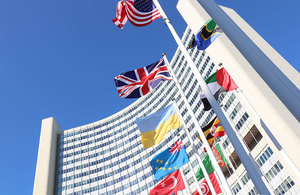UK leads call for ICC to investigate Russia’s war crimes
The UK has galvanised allies to refer atrocities in Ukraine to the International Criminal Court.
38 nations have now grouped together to expedite an ICC investigation, through state party referral.
The ICC Prosecutor can now proceed straight to an investigation.
The UK has led efforts to bring together allies today to expedite an ICC investigation into Russian war crimes in Ukraine, through state party referral. With 37 countries joining the UK, it is the largest referral in the history of the ICC.
Following a preliminary examination of the situation in Ukraine, opened by the International Criminal Court (ICC) in 2014 after Russia’s illegal annexation of Crimea, the Prosecutor has, on Monday 28 February, stated his intention to seek authorisation from the ICC judges to launch an investigation into the Situation in Ukraine.
State party referral, made by a group of 38 countries, will enable the Prosecutor to proceed straight to an investigation, without the need for judicial approval.
Russia’s use of indiscriminate force against innocent civilians, in its illegal and unprovoked invasion of Ukraine, amounts to war crimes, for which the Putin regime must be held accountable.
The Foreign Secretary Liz Truss said:
Putin’s military machine is targeting civilians indiscriminately and tearing through towns across Ukraine.
An investigation by the International Criminal Court into Russia’s barbaric acts is urgently needed and it is right that those responsible are held to account. The UK will work closely with allies to ensure justice is done.
Deputy Prime Minister, Lord Chancellor and Secretary of State for Justice, Dominic Raab, said:
As a founder member of the International Criminal Court, the UK is willing to provide the necessary technical assistance to support successful convictions.
The critical task now is to preserve properly all evidence of war crimes.
Any Russian leader or officer carrying out orders that amount to war crimes should know they face ending up in the dock of a court and ultimately in prison.
This referral is made by the following group of States Parties: Republic of Albania, Commonwealth of Australia, Republic of Austria, Kingdom of Belgium, Republic of Bulgaria, Canada, Republic of Colombia, Republic of Costa Rica, Republic of Croatia, Republic of Cyprus, Czech Republic, Kingdom of Denmark, Republic of Estonia, Republic of Finland, Republic of France, Georgia, Federal Republic of Germany, Hellenic Republic, Hungary, Republic of Iceland, Ireland, Republic of Italy, Republic of Latvia, Principality of Liechtenstein, Grand Duchy of Luxembourg, Republic of Malta, Kingdom of Norway, Kingdom of the Netherlands, New Zealand, Republic of Poland, Republic of Portugal, Romania, Slovak Republic, Republic of Slovenia, Kingdom of Spain, Kingdom of Sweden*, Swiss Confederation, United Kingdom of Great Britain and Northern Ireland.
Lithuania have also made a coordinated referral.
ENDS


